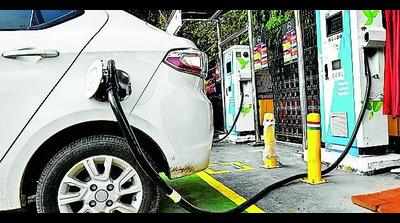- News
- City News
- delhi News
- Car buyers in Delhi left in dark as EV policy runs out of charge
Trending
Car buyers in Delhi left in dark as EV policy runs out of charge
Delhi car buyers have been without electric vehicle subsidies for six months due to the lapse of the EV policy. Transport minister Kailash Gahlot highlighted bureaucratic delays, hindering the extension of the policy. The public's subsidy benefits have been affected, impacting the EV penetration in Delhi.


Transport minister Kailash Gahlot claimed that the extension was hindered by bureaucratic delays, depriving the public of subsidy benefits for six months.“This should be expedited so that the people can benefit and Delhi can continue to be the No. 1 state in terms of EV penetration,” said Gahlot on Tuesday.
A transport department official said that the executive order for the policy extension was approved by the state cabinet but could not be implemented due to the operation of the model code of conduct for the Lok Sabha elections. “We have now sent the extension proposal again for approval,” the official said, adding that it was expected to be cleared in a week’s time.
The official added that there were issues related to the bank managing the EV subsidy portal. “The portal hadn’t used the vehicle number as a unique ID number, which may have led to discrepancies,” she said. “So the delay was on the part of the bank. However, now the portal has been rectified.”
Under the EV policy, the purchase of an electric two-wheeler involves a subsidy of Rs. 5,000 per kWh of battery capacity (maximum Rs. 30,000). Three-wheelers offer a subsidy of Rs. 30,000 per vehicle, irrespective of total cost and battery capacity. The subsidy for four-wheelers is not applicable any longer because it had been offered only for the first 1,000 EVs registered in Delhi under that particular scheme.
The government wanted to formulate EV Policy 2.0 in October last year after the expiry of the current policy in August. It even carried out consultations with different stakeholders, but that attempt too was stalled, leading to the old policy getting repeat extensions.
After the shift to CNG from petrol and diesel, the transition to EVs is the biggest change in car use in the capital. Commercial EVs have also seen a huge jump in sales. In 2021, 426 e-commercial cars were sold. This increased to 2,515 in 2022 and to 2,453 in 2023.
Anil Chhikara, faculty at the Asian Institute of Transport Development, cautioned that the prolonged absence of EV subsidies would leave many potential buyers of such vehicles in Delhi without the financial support they had anticipated and this could potentially slow down the adoption of eco-friendly transportation in the city. “An EV has a higher upfront cost and it is still in a nascent stage. Govt should ensure a subsidy for people to popularise the purchase of e-vehicles,” said Chhikara. Otherwise, the enthusiasm of EV stakeholders diminishes, he added.
End of Article
FOLLOW US ON SOCIAL MEDIA










